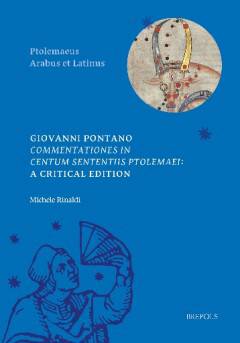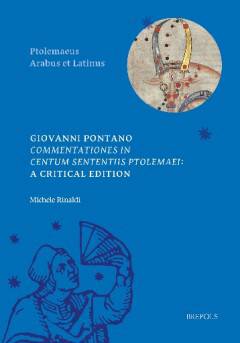
- Afhalen na 1 uur in een winkel met voorraad
- Gratis thuislevering in België vanaf € 30
- Ruim aanbod met 7 miljoen producten
- Afhalen na 1 uur in een winkel met voorraad
- Gratis thuislevering in België vanaf € 30
- Ruim aanbod met 7 miljoen producten
Zoeken
Giovanni Pontano, Commentationes in Centum Sententiis Ptolemaei
A Critical Edition
Giovanni Pontano, Michele Rinaldi
Hardcover | Engels, Latijn
€ 90,10
+ 180 punten
Omschrijving
With more than two hundred extant manuscripts, Pseudo-Ptolemy's Centiloquium undoubtedly is one of the most popular works of Western Latin astrology. The Commentationes in centum sententiis Ptolemaei is an astrological work in two books in which Giovanni Pontano provides an extensive commentary on the Centiloquium along with his own translation of the original text from Greek. The first book is addressed to the Duke of Urbino, Federico da Montefeltro, and the second one to Pontano's close friend and member of the Neapolitan Academy Pietro Golino (Petrus Compater). Pontano undertook the work in 1477 and kept supplementing and revising it until 1490. The Commentationes had a substantial impact on the astrological literature of the 15th-17th centuries. Published posthumously in 1512 by Pietro Summonte - but previously widespread through a noteworthy manuscript tradition - it was reprinted over twenty times until 1674 and became the standard Latin translation of the Centiloquium. While - together with the De rebus coelestibus - it represents the most challenging of Pontano's astrological prose, up to date, the Commentationes has never been published in a critical edition nor studied in its textual history.
Specificaties
Betrokkenen
- Auteur(s):
- Uitgeverij:
Inhoud
- Aantal bladzijden:
- 300
- Taal:
- Engels, Latijn
Eigenschappen
- Productcode (EAN):
- 9782503610160
- Verschijningsdatum:
- 11/09/2025
- Uitvoering:
- Hardcover
- Formaat:
- Genaaid
- Gewicht:
- 1297 g

Alleen bij Standaard Boekhandel
+ 180 punten op je klantenkaart van Standaard Boekhandel
Beoordelingen
We publiceren alleen reviews die voldoen aan de voorwaarden voor reviews. Bekijk onze voorwaarden voor reviews.








